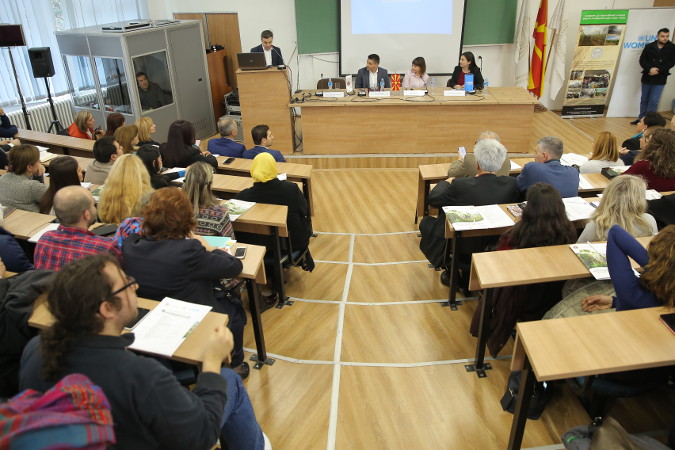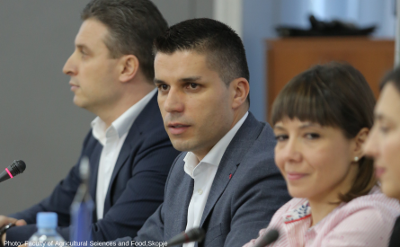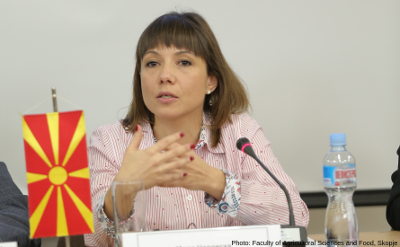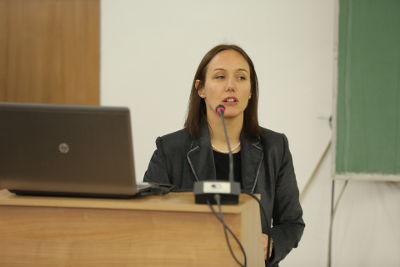Press Release: Making agriculture and rural development policies respond to women’s needs in FYR Macedonia
Findings of a UN Women-supported research in the former Yugoslav Republic of Macedonia showed that only 12 per cent of women in rural areas are land owners and less than 10 per cent have decision-making roles related to land. While women in agriculture work on average 11.06 hours per day, 41,7% of the total workload belongs to unpaid work.Date:

(Skopje, 7 February) – The Faculty of Agricultural Sciences and Food presented key findings and policy recommendations of the project “Measuring Women’s Empowerment in Agriculture with survey-based and experimental economics methods,” with support from UN Women.
The research showed that only 12.01 per cent of women in rural areas are land owners and less than 10 per cent have decision-making roles related to land. According to the research, women would be more empowered if they are given greater responsibility for farm accountancy, control over income use, ownership of assets and input in decision-making.
The event gathered around 150 participants, including international and local experts working on gender in agriculture and rural development, civil society representatives and students. During the event, the Minister of Agriculture, Forestry and Water Economy, Ljupcho Nikolovski; Minister of Labour and Social Policy, Mila Carovska; Dean of the Faculty of Agricultural Sciences and Food, Prof. Vjekoslav Tanaskovikj; and Head of UN Women office in Skopje, Vesna Ivanovikj-Castarede addressed the audience highlighting the importance of evidence-based policy-making for engendering rural development policies.
“The technical and expert support of UN Women made great impact, and made us think and act for advancing gender equality through research and evidence-based data. It was also an opportunity for policy-making in rural development”, said Prof. Vjekoslav Tanaskovikj.

Minister Nikolovski emphasized the strong commitment of the Ministry of Agriculture, Forestry and Water Economy for advancing gender equality: “As a Ministry, we are actively working in creating measures to initiate and support participation of women from rural areas in agriculture. We are sending a clear message for economic empowerment of women from rural areas and their greater inclusion in rural development, as well as for fighting discrimination and traditional barriers, which are the root causes for lack of education and advancement of women from rural areas.”

“In order to speak for greater inclusion of women as leaders, we need to talk about land ownership,” said Minister Carovska. She also noted that “lack of land ownership rights is a major limitation factor for the advancement of women in rural areas”.
Vesna Ivanovikj-Castarede emphasized that "incorporating gender perspective in agriculture and rural development is particularly important for recognizing the different needs and roles that women and men have, as well as traditional gender norms that influence those roles”.
Assistant Professor Marina Nacka, key national expert and coordinator of the project, noted that women’s participation in decision-making processes related to the agricultural production and use of income is very low.
Andreas Drichoutis, Assistant Professor at the Agricultural University of Athens, presented the results of a survey and a lab-in-the-field experiment. Prof. Drichoutis reported on the five domains the researched encompassed: Input in productive decisions, Ownership of assets/Access to and decisions on credit, Control over use of income, Group membership and Workload, noting that men are more empowered than women across all domains. Women, according to the findings, are facing biggest challenges in the areas of ownership of assets, input in productive decisions and control over use of income.
Rodolfo M. Nayga, Jr., Distinguished Professor & Tyson Endowed Chair, at the University of Arkansas, reflected on the importance of the evidence-based research for policy implications. “The higher the disempowerment of women, the less likely that more money will make women choose the efficient allocation - meaning that giving disempowered women more money would not necessarily help unless they are given more empowerment,” noted Prof. Nayga.

Prof. Ana Kotevska from the Faculty of Agricultural Sciences and Food, who reviewed the national policies and programmes for agriculture from a gender perspective, emphasized the need for gender-sensitive policies and programmes and use of gender-disaggregated data and statistics in the development and evaluation of programmes.
The event concluded with an open debate on proposed policy recommendations including the establishment of a gender equality sector and sub-sectoral group at the Ministry of Agriculture, Forestry and Water Economy, inter-institutional collaboration, gender-sensitive measures to stimulate and support women in agriculture, among others.